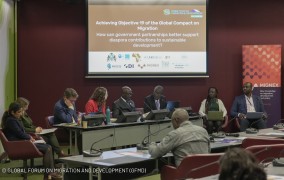MIGNEX Insight
Afghan entrepreneurs cite migration as their last hope to save business
Afghan factory owners in Kabul, interviewed as part of the MIGNEX qualitative data collection in June 2021, told us migration provides a lifeline for businesses amidst insecurity and volatility. Before the Taliban takeover, they aspired and planned to migrate. Today, they speak of a forced immobility that is putting their lives, businesses, and hopes in danger.
In the weeks following the fall of Kabul, analysis of the business environment has remained scarce. Yet, commentators revealed cause for concern: in Kandahar, over 150 factories closed in just a few weeks due to a lack of electricity and significantly lower tariffs on imported goods from Pakistan. We got back in touch with one of our informants from the MIGNEX study, who estimates that “60% of factories in Kabul are closed”.
These trends had been reported in qualitative data collection in June 2021, where trust in the business environment had already waned, and entrepreneurs were looking to leave to save their businesses. In interviews with factory owners in Kabul, we found that many who were once thriving were under visible strain due to the lack of electricity, the mounting insecurity, and the unpredictable business environment. Business owners had just returned from regional tours of neighbouring countries to consider options to relocate their industrial plants in order to survive.
In June, their key concern was how to plan their business continuity, across borders, to new locations. Business owners had planned to leave as the environment had long stopped being functional and supportive for them. Over the last three years, inadequate government support in the face of four successive phases of the COVID-19 pandemic, and the lack of support services, such as electricity, for companies, meant they had lost trust in their business environment. While this trust was lost prior to August, their hopes are now lost as well. In September, they realised that their dreams of mobility and relocation had come to an end. But as with the rest of the population, for Afghan businesses we interviewed migration and development are intrinsically linked.
Businesses have suffered under COVID-19, the Ghani administration, and now the Taliban
“My business is on hold, and this is not only the case with me, but with all others. At the beginning it was COVID-19, quarantine, and now the regime change.”
While this juice factory owner had plans to move his factory, he is now unable to do so, as all of his capital has been invested in machinery. The current situation does not allow factory owners to place orders for raw materials that they need to import from Iran, which further disrupts their business cycle. The closure of borders, the reduction in the movement of goods and of trade overall, is one aspect of the irreparable damage done to local economic development and mobility.
The forced immobility of businesses – and their staff – in Kabul
All business owners we spoke to – including beyond manufacturing, such as those in the agribusiness, for example aloe vera producers – explained that their businesses could no longer be moved, and that their labourers, who they had to let go, would not be able to migrate either.
While these business owners had been forced to let go of their staff in August, after the fall of Kabul, they had hoped their decision would provide their staff with the incentive to leave and build a better future for themselves elsewhere. But they soon found out that their staff could not leave. Factory workers could not afford to leave as regular pathways were closed, with only dangerous journeys ahead. They found they had no option but to stay and wait.
The same immobility has now struck the business owners who, just three months ago, spoke to us about plans to relocate their plants in the region. To do so would require ease of mobility, money to move their capital, and contracts, all of which have now gone under the Taliban. They also face the same fate as their workers: waiting, as they currently do not have enough information to plan ahead.
The concern of these businesses is that officials from Chambers of Commerce in the country – and other ministerial counterparts in charge of the private sector – have left Afghanistan. They have no one to turn to in order to save their businesses.
“I cannot move my machinery to another place as it’s all metal, and without savings, I cannot afford to relocate. I let go of all my employees, and they cannot go abroad, as they do not have the income to do so. The salary which we were giving them was 7000 AFN to 12000 AFN. How can they go abroad with such an income?”
What can be done now to support Afghan businesses?
While these business owners would like to move, if they did they would have to forfeit their investments. Others feel no choice but to move: even if their businesses could resume working, if their daughters are unable to attend school, “then it does not make sense to stay just for the business”, explains Ibrahim. “We are part of society and we have to develop from all perspectives, not just one. For example, my wife is educated, if she cannot work then there is no benefit to stay in this country.”
In the last few years, donor funding has supported businesses in Afghanistan, but not enough investment has been made into the link between mobility and entrepreneurship. Yet, when we spoke to the factory owners, they drew on their experience and capital gained through their migration to succeed. They explained how they gained skills while working as apprentices during their first migration to Iran 30 years prior, before returning to Afghanistan to use these; and how they maintained transnational links to secure contracts and develop their business.
This type of knowledge transfer could be scaled up in Afghanistan if there were more legal migration pathways. The international community has a role to play – through conversations with chambers of commerce in neighbouring countries, and schemes to allow those with skills, knowledge, but no longer any capital, to continue to contribute to the regional economy and value chains.



